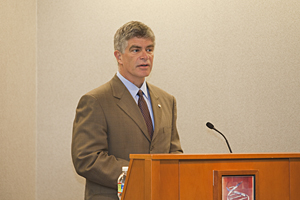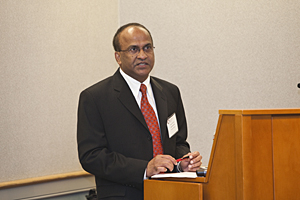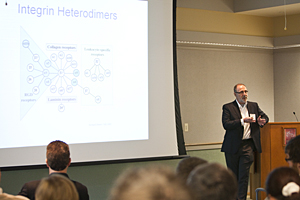


ADVERTISEMENT
- Rozovsky wins prestigious NSF Early Career Award
- UD students meet alumni, experience 'closing bell' at NYSE
- Newark Police seek assistance in identifying suspects in robbery
- Rivlin says bipartisan budget action, stronger budget rules key to reversing debt
- Stink bugs shouldn't pose problem until late summer
- Gao to honor Placido Domingo in Washington performance
- Adopt-A-Highway project keeps Lewes road clean
- WVUD's Radiothon fundraiser runs April 1-10
- W.D. Snodgrass Symposium to honor Pulitzer winner
- New guide helps cancer patients manage symptoms
- UD in the News, March 25, 2011
- For the Record, March 25, 2011
- Public opinion expert discusses world views of U.S. in Global Agenda series
- Congressional delegation, dean laud Center for Community Research and Service program
- Center for Political Communication sets symposium on politics, entertainment
- Students work to raise funds, awareness of domestic violence
- Equestrian team wins regional championship in Western riding
- Markell, Harker stress importance of agriculture to Delaware's economy
- Carol A. Ammon MBA Case Competition winners announced
- Prof presents blood-clotting studies at Gordon Research Conference
- Sexual Assault Awareness Month events, programs announced
- Stay connected with Sea Grant, CEOE e-newsletter
- A message to UD regarding the tragedy in Japan
- More News >>
- March 31-May 14: REP stages Neil Simon's 'The Good Doctor'
- April 2: Newark plans annual 'wine and dine'
- April 5: Expert perspective on U.S. health care
- April 5: Comedian Ace Guillen to visit Scrounge
- April 6, May 4: School of Nursing sponsors research lecture series
- April 6-May 4: Confucius Institute presents Chinese Film Series on Wednesdays
- April 6: IPCC's Pachauri to discuss sustainable development in DENIN Dialogue Series
- April 7: 'WVUDstock' radiothon concert announced
- April 8: English Language Institute presents 'Arts in Translation'
- April 9: Green and Healthy Living Expo planned at The Bob
- April 9: Center for Political Communication to host Onion editor
- April 10: Alumni Easter Egg-stravaganza planned
- April 11: CDS session to focus on visual assistive technologies
- April 12: T.J. Stiles to speak at UDLA annual dinner
- April 15, 16: Annual UD push lawnmower tune-up scheduled
- April 15, 16: Master Players series presents iMusic 4, China Magpie
- April 15, 16: Delaware Symphony, UD chorus to perform Mahler work
- April 18: Former NFL Coach Bill Cowher featured in UD Speaks
- April 21-24: Sesame Street Live brings Elmo and friends to The Bob
- April 30: Save the date for Ag Day 2011 at UD
- April 30: Symposium to consider 'Frontiers at the Chemistry-Biology Interface'
- April 30-May 1: Relay for Life set at Delaware Field House
- May 4: Delaware Membrane Protein Symposium announced
- May 5: Northwestern University's Leon Keer to deliver Kerr lecture
- May 7: Women's volleyball team to host second annual Spring Fling
- Through May 3: SPPA announces speakers for 10th annual lecture series
- Through May 4: Global Agenda sees U.S. through others' eyes; World Bank president to speak
- Through May 4: 'Research on Race, Ethnicity, Culture' topic of series
- Through May 9: Black American Studies announces lecture series
- Through May 11: 'Challenges in Jewish Culture' lecture series announced
- Through May 11: Area Studies research featured in speaker series
- Through June 5: 'Andy Warhol: Behind the Camera' on view in Old College Gallery
- Through July 15: 'Bodyscapes' on view at Mechanical Hall Gallery
- More What's Happening >>
- UD calendar >>
- Middle States evaluation team on campus April 5
- Phipps named HR Liaison of the Quarter
- Senior wins iPad for participating in assessment study
- April 19: Procurement Services schedules information sessions
- UD Bookstore announces spring break hours
- HealthyU Wellness Program encourages employees to 'Step into Spring'
- April 8-29: Faculty roundtable series considers student engagement
- GRE is changing; learn more at April 15 info session
- April 30: UD Evening with Blue Rocks set for employees
- Morris Library to be open 24/7 during final exams
- More Campus FYI >>
3:20 p.m., Nov. 22, 2010----More than one-third of all deaths in the U.S. are attributed to cardiovascular disease, and Americans spend close to $300 billion annually for cardiovascular-related healthcare.
With those alarming statistics, the prevention and treatment of cardiovascular disease are the focus of a new research center at the University of Delaware.
The Delaware Cardiovascular Research Center (DCRC) was inaugurated on Monday, Nov. 22, at the Delaware Biotechnology Institute (DBI), where the new center will initially be housed.
Ulhas Naik, professor in UD's Department of Biological Sciences, is serving as director of DCRC.
DBI director Kelvin Lee, who welcomed the 100-plus guests to the one-day inaugural symposium, said that DBI provides support for life sciences research and has already been instrumental in launching several interdisciplinary initiatives, including the Delaware INBRE (IDeA Network of Biomedical Research Excellence) Program, the DBI BioImaging Center, and the Center for Bioinformatics and Computational Biology.
UD President Patrick Harker officially inaugurated the new center, which he referred to as a critical component of the Delaware Health Sciences Alliance (DHSA).
“Since we announced the alliance's formation in March 2009, we've seen the enormous power of collaboration,” he said. “With our four partner institutions working together, our scope, our strength, and our impact aren't merely amplified by a factor of four -- our work is exponentially greater.”
“Together, we have the capacity for breakthrough biomedical research and biotech development, high-quality health sciences education, and good healthcare policy and delivery. This inauguration is the latest milestone over nearly two years that have seen many of them -- important clinical partnerships and conferences, joint research, and innovative teaching and degree collaborations.”
George Watson, dean of the College of Arts and Sciences, said that interdisciplinary centers like DCRC are critically important in recruiting and retaining excellent faculty. “Interdisciplinarity is a major component of our college strategic plan and a major criterion in tenure-track faculty hiring,” he said.
Kathleen Matt, dean of the UD College of Health Sciences and executive director of DHSA, spoke of the importance of translation. “We have to do more than just contribute to research if our work is going to have an impact on patients and their families,” she said. “We have to hand-carry it.”
UD's new Science and Technology Campus, Matt said, will become home to the DCRC and other similar programs that are aimed at taking research from the bedside to the bench and back to the bedside.
Matt also talked about racial, gender, and geographical disparities in the incidence and treatment of cardiovascular disease, as well as the need to be aware of hormonal, exercise and nutritional effects. “These factors affect how we roll out programs for prevention, diagnosis and treatment,” she said.
Karl Steiner, senior associate provost for research development at UD, spoke of the significant advances made in Delaware's biomedical research capability over the past decade, particularly through Delaware INBRE.
“One outcome of INBRE was establishment of the Center for Translational Cancer Research,” Steiner said. “That's a model we should strive for in developing the cardiovascular center.”
Randall Duncan, chair of UD's Department of Biological Sciences, pointed to interdisciplinary lab space and key core facilities like those provided by DBI as being critical to successful collaboration.
The symposium also included a keynote address by Mark H. Ginsberg, M.D., professor in the Department of Medicine at the University of California San Diego, on “Dynamic Regulation of Cell Adhesion in Vascular Biology.” Ginsberg's research focuses on understanding the reaction of cells to their surroundings, specifically cell adhesion mechanisms in relation to immune responses.
Ginsberg's address was followed by presentations from Naik, Samuel Gidding of Nemours, and William Weintraub of CCHS describing ongoing cardiovascular research activities at their respective institutions.
Kirk Czymmek, associate professor of biology and director of bioimaging at DBI, discussed the core instrumentation available for researchers among member institutions of the center.
The event also featured a research poster session and reception.
About the Delaware Cardiovascular Research Center
The DCRC brings together more than 50 researchers, physicians, and educators from DHSA member institutions to focus on ways to prevent and treat cardiac, vascular, and blood diseases. These investigators encompass more than 20 specialties: from epidemiology and pharmacology to preventive cardiology and cardiovascular surgery. They tackle cardiovascular problems through basic research, clinical investigation, diagnosis, treatment, and public education. The center provides a focal point for interdisciplinary research and training as well as state-of-the-art instrumentation and facilities.
Article by Diane Kukich
Photos by Ambre Alexander


